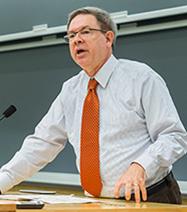Religious Liberty and the Constitution
New Supreme Court Cases Discussed by a Panel of Experts at Columbia Law School
New York, November 23, 2015—A spirited debate over religious liberty and the personal rights of corporations took over a panel discussion at Columbia Law School on new cases before the U.S. Supreme Court.
The Nov. 10 event, “Religious Liberty and the Constitution,” featured Walter Olson, a senior fellow at the Cato Institute’s Center for Constitutional Studies, and Columbia Law School Professors Katherine M. Franke and Philip Hamburger. It was hosted by the American Constitution Society and the Federalist Society; co-sponsors included the Center for Gender and Sexuality Law’s Public Rights/Private Conscience Project, the Center for Law and Liberty, the Jewish Law Students Association, the Columbia Muslim Law Students Association, and the Christian Legal Society.
| Featured speakers at the Nov. 10 event included, from left to right: Columbia Law School Professors Katherine M. Franke and Philip Hamburger, and Walter Olson, a senior fellow at the Cato Institute’s Center for Constitutional Studies. |
This month the Supreme Court announced it would again take up the conflict between religious freedom and access to birth control, hearing another case in which religious employers object to the federal mandate to provide worker health insurance with contraception coverage. The Obama administration’s already offered to excuse these employers—religiously affiliated nonprofits—and provide contraception access to their employees. But the employers are contesting a requirement to make a formal application and notify insurers in order to get the accommodation, believing these actions make them complicit in the sinful practice of supplying birth control.
Last year, in Burwell v. Hobby Lobby Stores, the Court ruled for-profit companies with religious owners could not be forced to provide employee insurance with contraception coverage, though the Affordable Care Act requires it.
“This is one of the hottest issues of the last few terms,” said Franke, the Isidor and Seville Sulzbacher Professor of Law, director of the Center for Gender and Sexuality Law, and author of the new book Wedlocked: The Perils of Marriage Equality. “I’m calling the new cases ‘Hobby Lobby 2.0.’”
Hamburger, a Constitutional scholar, wondered why critics of the Hobby Lobby ruling keep referring to it as a Constitutional case. “Hobby Lobby was just a statutory case,” he said. “It’s just an application of RFRA, the Religious Freedom Restoration Act.” That 1993 statute grants broad religious liberty rights to any person, including—as the Supreme Court has ruled—a corporation.
The significance of Hobby Lobby, Hamburger said, is what it suggests about who can claim First Amendment rights. “Citizen United was about whether or not corporations have free speech rights,” said Hamburger, the Maurice and Hilda Friedman Professor of Law and the director of the Center on Law and Liberty. Now corporations were making constitutional claims of religious liberty.
“The Bill of Rights secures our freedom of speech, and it does this not merely by recognizing the right in individuals—that wouldn't be enough—but more generally by limiting federal power as to speech. If the federal government has power over speech that affects all persons, corporations as well as individuals, it should be no surprise the Bill of Rights limits the government’s power over speech as to all such persons.
Olson agreed that Hobby Lobby was a statutory, not constitutional, case. “As I watched it unfold, I was amazed by the overblown reactions on both sides,” said Olson, who also founded and still runs the blog Overlawyered.com. “Because it is a statutory interpretation case, it can't possibly justify the rhetoric about being only one Supreme Court justice away from losing or gaining this liberty.”
He thought a more likely occurrence would be “Congress changing RFRA,” but both liberals and conservatives are “afraid of reopening it.”
“There's been an extraordinary reversal of ideological sides on the religious accommodation issue,” Olson said. “Over the years we knew which side generally progressives were on and which side conservatives were on—it was the opposite of the current side. When peace churches wanted an exemption from war fighting, it was the progressive position that they should get it, and it was the conservative position to deny it.” He said RFRA was “the liberal response” to the 1990 Supreme Court decision Employment Division v. Smith, which refused constitutional rights for a religious accommodation in the case of a man who was denied unemployment benefits for using peyote, though the drug was part of a religious ritual.
“While there has been some buyers’ regret on the one side, the conservatives who had opposed all these developments in religious accommodation at the time have come to see some merit because it's their own side whose ox is being gored. I find this to be the perfect opportunity to ask people what they believe, are they with the conservatives today and the progressives of yesterday, or are they with the conservatives of yesterday and the progressives of today?”
Franke didn’t see any reversal of bedrock beliefs. “The Supreme Court's religious liberty cases in a pre-RFRA era were almost uniformly about situations where minority religionists were being discriminated against or were otherwise having to comply with majority, Protestant Christian rules,” she said. “The first amendment jurisprudence—from the left of the Court, I would agree—regarded these cases as like other discrimination cases. The religious liberty cases emerged at the same time as the racial discrimination cases more generally, as the Court was building a jurisprudence of minority rights, and the religious liberty rights were very much about protecting minority rights.
“Today we're not looking so much at minority religionists asserting claims under RIFRA. It's actually more majority religionists. The Court’s been consistent around minority religionists. It's been the Hobby Lobby kind of case where we see what I consider to be a different political claim being made in the name of religious liberty in an effort to rewrite the law and say, ‘The law doesn’t apply to me and my corporation. I get to pick and choose which laws I want to comply with,’ particularly in contexts where those choices have effects on third parties, like the employees of Hobby Lobby who have a statutory entitlement to coverage for contraception. ‘We're not going to comply with the Affordable Care Act and thereby deny employees to sex-based workplace equality.’”
While Franke “identified exactly the issues” at play, Hamburger said, “The idea that Christians with traditional views are a majority is a little comic. We must recognize how profoundly this is a complexly fractured society, not simply a majority-minority society.” Laughter greeted Franke’s next question to the students, asking whether she should open the panel to questions or “go back at these two fellows—they’re completely wrong in what they say.” Hamburger answered, “The question ultimately is not simply who is right or wrong, but what arguments one makes. We all disagree, and yet we have fun debating these questions. I hope you do the same thing among yourselves.”


